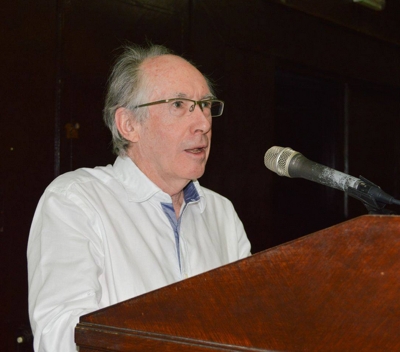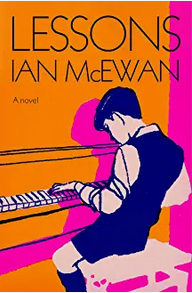Lisa Allardice recently interviewed Ian McEwan for The Guardian (“Ian McEwan on ageing, legacy and the attack on his friend Salman Rushdie: ‘It’s beyond the edge of human cruelty'”). The occasion was the release of Lessons, the new novel by McEwan, who was the keynote speaker at the 5th Biennial John Updike Society conference at the University of Belgrade, Serbia.
The nearly 500-page novel, which mentions the fatwa against Rushdie, is “far longer than McEwan’s characteristically ‘short, smart and saturnine’ novels, as John Updike summed up in a 2002 review of Atonement,” Allardice wrote. “McEwan’s ambition with Lessons, his 18th novel, was to show the ways in which ‘global events penetrate individual lives,’ of which the fatwa was a perfect example. ‘It was a world-historical moment that had immediate personal effects, because we had to learn to think again, to learn the language of free speech,’ he says.”
“Billed as ‘the story of a lifetime,’ it is in many ways the story of McEwan’s life. ‘I’ve always felt rather envious of writers like Dickens, Saul Bellow, John Updike and many others, who just plunder their own lives for their novels,’ he explains. ‘I thought, now I’m going to plunder my own life, I’m going to be shameless.'”
“‘I’ve read so many literary biographies of men behaving badly and destroying their marriages in pursuit of their high art. I wanted to write a novel that was in part the story of a woman who is completely focused on what she wants to achieve, and has the same ruthlessness but is judged by different standards,’ he explains. ‘If you read Doris Lessing’s cuttings they will unfailingly tell you that she left a child in Rhodesia.'”
Asked whether, at age 75, he worries about his legacy, McEwan responded, “I’d like to continue to be read, of course. But again, that’s entirely out of one’s control. I used to think that most writers when they die, they sink into a 10-year obscurity and then they bounce back. But I’ve had enough friends die more than 10 years ago, and they haven’t reappeared. I feel like sending them an email back to their past to say, ‘Start worrying about your legacy because it’s not looking good from here.'”
Allardice wrote, “He was greatly saddened by what he describes as ‘the assault on Updike’s reputation’; for him, the Rabbit tetralogy is the great American novel. Saul Bellow, another hero, has suffered a similar fate for the same reasons, he says. ‘Those problematic men who wrote about sex—Roth, Updike, Bellow and many others.'”
“We’ve become so tortured about writing about desire. It’s got all so complex,’ he says. ‘But we can’t pretend it doesn’t exist. Desire is one of the colossal awkward subjects of literature, whether it’s Flaubert you’re reading or even Jane Austen.'”
Read the whole interview.


